- Home
- James S. A. Corey
Gods of Risk: An Expanse Novella Page 2
Gods of Risk: An Expanse Novella Read online
Page 2
Half an hour later, the emergency hatch at the end of the car creaked, popped, and opened. A man and a woman in matching blue security uniforms stepped in.
“Hey, folks,” the man said. “Everyone all right? Sorry about this, but some jackhole broke the vacuum seals. Whole system’s going to be down for about six hours, minimum. Some places longer. We’ve got service carts out here that can take folks to transport buses. Just line up single file, and we’ll get you where you’re going.”
Leelee was humming to herself as David drew her into line. He couldn’t get her to Innis Shallow and get back home. Not with the tubes down. He bit his lips and they moved forward one at a time, the other passengers vanishing through the emergency hatch and into the temporary airlock beyond it. It took forever to reach the front of the line.
“Where are you two headed?” the security man asked, consulting his hand terminal. It was working, even though David’s wasn’t. The man looked up, concerned. “Hermano. Where are you two headed?”
“Innis Shallows,” David said. And then, “She’s going to Innis Shallows. I was taking her there, because she’s not feeling so good. But I’ve got to get to Breach Candy. I’m going to miss my labs.” Leelee stiffened.
“Innis Shallows and Breach Candy. Step on through.”
The temporary airlock was made from smooth black Mylar, and walking through it was like going through the inside of a balloon. The pressure wasn’t calibrated very well, and when the outer seal opened, David’s ears popped. The hall was wide and low, the dull orange emergency lights filling the passage with shadows and leaching the color out of everything. The air was at least five degrees colder, enough to summon gooseflesh, and Leelee wasn’t holding his arm anymore. Her eyebrows were lifted and her mouth was set.
“It’ll be okay,” he said as they came close to the electric carts. “They’ll get you home all right.”
“Yeah, fine,” she said.
“I’m sorry. I’ve got to get home. My dad—”
She turned to him. In the dim light, her dilated eyes didn’t seem as out of place. Her sobriety made him wonder how much she’d really been feeling it before and how much had been a playful kind of acting.
“Don’t worry about it,” she said. “Not the first time I’ve been tripping in public, right? I can behave myself. Just thought you’d come play and I was wrong. Hard cheese for me and moving on now.”
“I’m sorry. Next time.”
“You call it,” she said with a shrug. “Next time.”
The driver of the cart for Innis Shallow called out, and Leelee clambered aboard, squeezed between a middle-aged man and a grandmotherly woman, and waved back at David once. The middle-aged man glanced at David, back at Leelee, then down at the girl’s body. The cart lurched, whined, and lurched again. David stood, watching it pull away. The mixture of shame, regret, and longing felt like an illness. Someone touched his elbow.
“Breach Candy?”
“Yes.”
“Over here, then. Damn. You’re a big one, aren’t you? All right, though. We’ll fit you in.”
It was two years almost to the day since David had met Hutch at the lower university. David had been in the commons, the wide, carpeted benches with their soft, organic curves welcoming the students eating lunch. At thirteen, David had already been biochemistry track for two years. His last labs had been in tRNA transport systems, and he was reading through the outline for the carbon complex work that would take up his next six months when one of the seniors—an olive-skinned boy named Alwasi—had sat down beside him and said there was someone David should meet.
Hutch had made himself out as more of a scholar back then but still with an edge to him. For months, David had thought the man was an independent tutor; the kind of hired instructor a family might bring on if their children were falling behind. David still had seven rounds of lab to go before his placement, so he hadn’t thought too much about Hutch. He’d just become another face in the whirl of the lower university, one more minor character in the cast of thousands. Or hundreds at least.
Looking back, David could sort of see how Hutch had tested him. It had begun with asking innocuous little favors—tell someone who shared David’s table that Hutch was looking for her, get Hutch a few grams of some uncontrolled reagent, keep a box for him overnight. They were things that David could do easily, and so he did. Every time, Hutch praised him or paid him back with small favors. David began to notice the people Hutch knew—pretty girls and tough-looking men. Several of the low-tier instructors knew Hutch on sight, and if they weren’t overly friendly to him, they were certainly respectful. There hadn’t been any one moment when David had crossed a line from being someone Hutch knew to cooking for him. It all happened so smoothly that he’d never felt a bump.
The fact was he would have done the side projects for Hutch without being paid. He couldn’t spend the money on anything too extravagant for fear his parents would ask questions, so he used it here and there—a little present for Leelee or lunch on him for the other students at his table or the occasional indulgence that he could explain away. For the most part, it just sat in the account, growing slowly over time. The money wasn’t precious because it was money. It was precious because it was secret and it was his.
When he had his placement and moved out to student housing in Salton, he’d have more freedom. Hutch’s money would buy him a top-flight gaming deck or a better wardrobe. He could take Leelee out for fancy dinners without having to explain where he’d been or who he’d been with. The workload would be harder, especially if he got placed in medical or development. He’d heard stories about first-year placements on the development teams who pulled fifty-six hour shifts without sleep. Carving out another six hours after that for Hutch might be hard, but he’d worry about that when he got there. He had more immediate problems.
The transport buses were old, wheezing electrical carts, some of them dating back two generations. The drivetrain clicked under him, and the rubberized foam wheels made a constant sticky ripping noise. David hunched in a seat, trying to pull his elbows close in against his body. Around him, the other travelers looked bored and restless. The system was still locked down, his hand terminal restricted to what it held in local memory. He checked it every few seconds just to feel he had something to do. The wide access corridors passed slowly, the conduits and pipes like the circulatory system of some vast planetary behemoth. It seemed like the corridor would go on forever, even though the distance between Martineztown and Breach Candy wasn’t more than forty kilometers.
He was supposed to be in his labs at the lower university. Even if all the public transport was locked down, it wasn’t more than a half-hour walk from there to home. David figured he could claim to have been in the middle of something and that it had taken longer than he’d expected to finish up the work. Except that was the excuse he’d been giving to cover the extra time he’d spent cooking for Hutch. His mother had already started wondering in her vague accusation-without-confrontation way whether he was losing focus on his work. If they found out he’d been outside the neighborhood, it would be bad. If they found out why, it would be apocalyptic. David cracked his knuckles and willed the bus to go faster.
It was easy to think of Londres Nova as existing only along its tube lines, but the truth was generations of colonists and prototerraformers had made a webwork of tunnels under the airless permafrost of Mars. Whole complexes of the original tunnels had gone fallow—sealed off and the atmosphere and heat allowed to flow away into the flesh of the planet. Supply passages linked to electrical maintenance lines. There were shortcuts, and the bus driver knew them. Just when David was about to weep or scream with frustration, he saw the edge of Levantine Park and the northernmost edge of Breach Candy. The bus was going faster than he could walk, but just knowing where he was, being able to map his own way home, made the frustration a little less. And the fear maybe a little more.
I didn’t do anything wrong, he told himself. I wa
s in my lab. There was a security alert and the network went down. I had to finish the experiment, and it took a little longer because everyone was trying to find out what had happened. That’s all. Nothing else.
The fifth time the bus stopped, he was as close to his family’s hole as he was going to be. He lumbered out into the corridors of his hometown, his head down and his shoulders tucked in toward his chest like he was trying to protect something.
The family lived in a series of eight rooms dug out of the stone and finished with textured organics. Rich brown bamboo floors met soft mushroom-brown walls. The lights were indirect LEDs alleged to match a sunny afternoon on Earth. To David, they were just the color house-lights were. A newsfeed was muttering in the common rooms, so some portion of the system must have been taken off security lockdown. David closed the door behind him and stalked through the kitchen, fists against his thighs, breath shallow and fast.
Aunt Bobbie was alone in the den. In any other family, she’d have been huge. For a Draper, she was only about the middle of the bell curve in height, but athletic and strong. She wore a simple loose-cut outfit that lived somewhere between sweats and pajamas. It mostly hid the shape of her body. She looked away from the video feed, her dark eyes meeting his, and killed the sound. On the screen, a reporter was speaking earnestly into the camera. Behind him, a lifting mech was hauling a slab of ferrocrete.
“Where’s Dad?” he asked.
“Stuck in Salton with your mom,” Bobbie said. “The blowout was on that line. Security’s saying they’ll have everything moving again in about ten hours, but your father said they’d probably be taking a room and coming home in the morning.”
David blinked. No one was going to give him any grief. It should have felt like relief. He shrugged, trying to get the tension out of his shoulders, but it wouldn’t go. He knew it didn’t make sense to be irritated with his parents for not being there to fight with.
“Do we know what happened?” he asked, stepping into the room.
“Sabotage,” Aunt Bobbie said. “Someone blew a hole between the tube and the maintenance corridor, sucked in a few thousand kilos of air. They took the vacuum seals off-line too, so the whole tube system popped like a balloon.”
“Earth?”
Aunt Bobbie shook her head.
“Earth doesn’t think that small,” she said. “This is someone local trying to start something.”
“Why would someone local blow up our own stuff if they’re mad at Earth?”
“Because Earth’s too far away.”
It didn’t sound like an answer to his question, but David let it go with another shrug.
Aunt Bobbie’s gaze was on the monitor and not on it. Through it. Seeing something else. He knew she’d been on Ganymede when the fighting started and that something had happened so that she wasn’t in the military anymore and she had to live with them. The unfairness of her bringing her problems into his house chafed. She sighed and forced a smile.
“How’d things go at the lab?”
“All right,” he said.
“What’re you working on?”
“Just labs,” he said, not looking at her.
“Your dad said he expected your placement to come through soon. Find out what you’ll be doing for the next eight years.”
“Guess.”
Aunt Bobbie smiled.
“I remember when I first got into training. There was a breakdown in the notification system, and they wound up losing my placement for about six days. I was chewing through rocks until it came through. What about you? Are you more excited, scared, or pissed off?”
“I don’t know,” he said.
“Your dad’s really proud of you,” Aunt Bobbie said. “Whatever happens, he’s going to be really proud of you.”
David felt the flush of warmth rising in his neck and cheeks. For a second he thought he was embarrassed, but then he recognized the rage. He clamped his jaw tight and looked at the monitor so that he wouldn’t be looking at Aunt Bobbie. The mech was gesturing to a ragged hole two meters high and half a meter wide, the man controlling it speaking to the reporter as steel claws pointed out the fine cracks fanning unpredictably out from the breach. David’s teeth ached and he made himself relax his jaw. Aunt Bobbie turned back to the screen. He couldn’t read her expression, but he had the feeling that he’d exposed something about himself he didn’t want her to know.
“We have anything for dinner?”
“I didn’t make anything,” she said. “Could, though.”
“It’s all right. I’ll grab a bowl of rice. I have work I need to do. Lab stuff.”
“Okay.”
David’s room was in the back. It had been cut from the ground with the image of a standard-sized person, and so it felt cramped to him. A standard bed would have left half a meter between the footboard and the wall; David’s was almost flush. The gaming deck, the only thing he’d ever spent Hutch’s illicit money on, sat at the side of the desk. The wall was set to a still from Gods of Risk where Caz Pratihari was about to duel Mikki Suhanam, both men looking strong, dangerous, and a bit melancholy. When the door was locked, he switched the wall to his favorite picture of Una Meing and threw himself to the bed. The newsfeed muttered from the common room, and under it—almost too faint to make out—Aunt Bobbie’s slow, rhythmic grunting. Resistance training probably. He wished he could make all the noises go away. That he could have the house to himself for once. He wondered if Leelee was all right. If she’d made it home safe. If she was angry with him. Or disappointed.
His hand terminal chimed. The alert was from the lower university. In response to the terrorist attack on the tube lines, the labs would be closed the following day. Students with ongoing work that couldn’t sit for an extra day were to reply to the section proctor who would either give them special authorization to come in or else do part of the work for them. He ran through a mental checklist. He didn’t have anything that needed him to be there, and if he got a little behind, everyone else would, too. He didn’t have any of Hutch’s reagents in his lab, so if there was a security audit, he’d be all right. He had a day off, then.
Leelee’s voice spoke in his memory. You never try the stuff yourself? Right now, somewhere in Innis Shallow, Leelee’s brain chemistry was cascading through a long series of biochemical waterfalls, one imbalance slipping to another, slipping to another. Her visual cortex firing in strange waves, her hippocampus blurring. He rolled to his side, reached between the bed frame and the wall, and plucked out the little felt bag. The pink lozenge looked tiny in his vast palm. It tasted like strawberry flavoring and dextrose.
David laced his fingers behind his head, looked at the woman on his wall looking back at him, and waited, waited, waited for the euphoria to come.
The lower university was one of the oldest complexes in Londres Nova; the first marks had been made by automated construction mechs when there had been only a few thousand people on the planet. The halls were simple, direct, rectilinear, and hard. In the commons area—what everyone referred to as “outside”—there had been some attempt to soften and humanize the space, but within, it was low ceilings and right angles. It didn’t help that the original colonial designs hadn’t recessed any of the infrastructure. Halls that were narrow already had water pipes and electrical cables crowding in at the corners. The flooring was all metal grate, and David had to duck to get through the doorways. The suction from hundreds of fume hoods venting out to the atmosphere reclamation plants kept a constant breeze blowing against the main doors, pushing the students in and then keeping them from getting out.
David’s locker was in the third hall corridor. Senior’s row. It was twice as wide as the one he’d had just the year before, and the locking mechanism didn’t stick the way the old one had. He’d put a couple decals on the outer face—a picture of Caz Pratihari, a kanji-print cartoon—but nothing like the multicolored glow of the one next to him. It belonged to an industrial engineering girl who he never saw unless t
hey were in the hall at the same time. All the lockers had something, though—a picture, a whiteboard, some in-joke one-liner printed on plastic and fused to the metal. Some little mark to say that this space belongs to someone in particular, someone a little—but only a little—different from the others.
At the end of the cycle, everyone in the senior’s row would get their placements, empty the lockers, and go to wherever they were put next. The lockers would be scrubbed clean, decontaminated, sealed, and made anonymous again for whichever student was assigned it next. David had heard about sand castles on beaches being washed away by the tide, but he’d never seen an ocean. The lockers of senior’s row were the closest analogue among things he actually knew.
David closed the door and turned down toward his workstation. With the tube stations running, his parents back at the house, and the lower university open, the lab was the place he disliked least. The long muscles in his back and legs still ached a little after his night sampling his own wares, and he was half relieved that he could tell Leelee he’d tried it and half relieved that his schedule wouldn’t let him try it again. The whole thing had been like having a very long, pleasant, but kind of boring dream. And it had left his head feeling a little hazy in a way he didn’t enjoy.
His lab work was almost at its final phase. The terminal built into his desk was arranged to display the data on all seven studies that were making up the complex tissue of his senior labs. They were all built around the single unified idea of trying to build complex cell structures that would sequester ferrous products. It wasn’t a holy grail, but it was a good, solid puzzle with a lot of applications for the terraforming efforts if it worked out. With the day out of lab, he had a double handful of data to look over and incorporate.

 Leviathan Wakes
Leviathan Wakes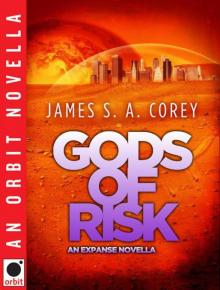 Gods of Risk
Gods of Risk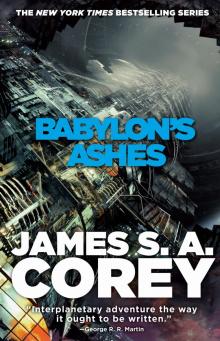 Babylon's Ashes
Babylon's Ashes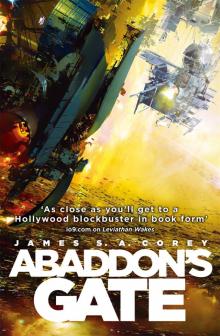 Expanse 03 - Abaddon’s Gate
Expanse 03 - Abaddon’s Gate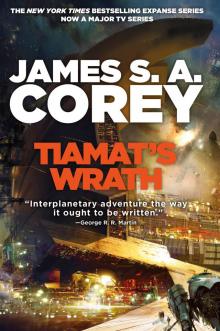 Tiamat's Wrath
Tiamat's Wrath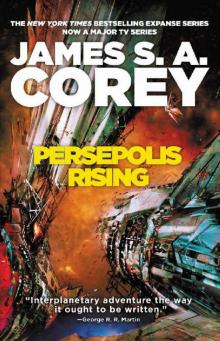 Persepolis Rising
Persepolis Rising The Butcher of Anderson Station
The Butcher of Anderson Station The Churn
The Churn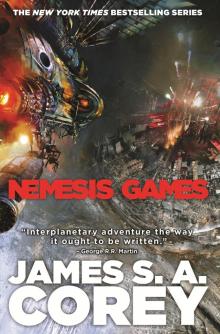 Expanse 05 - Nemesis Games
Expanse 05 - Nemesis Games Strange Dogs
Strange Dogs Honor Among Thieves: Star Wars
Honor Among Thieves: Star Wars Cibola Burn
Cibola Burn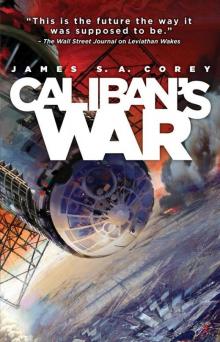 Caliban's War
Caliban's War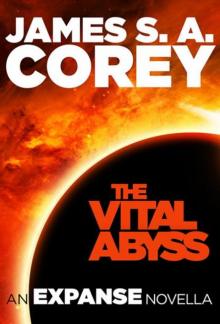 The Vital Abyss
The Vital Abyss Auberon
Auberon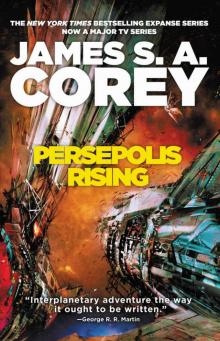 Persepolis Rising (The Expanse)
Persepolis Rising (The Expanse)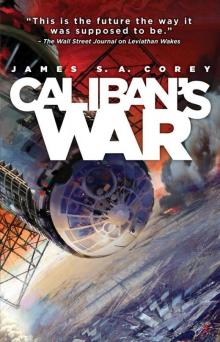 Caliban's War: Book Two of the Expanse series
Caliban's War: Book Two of the Expanse series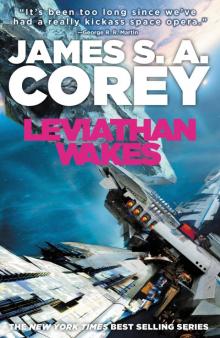 Leviathan Wakes: Book One of The Expanse
Leviathan Wakes: Book One of The Expanse Cibola Burn (Expanse)
Cibola Burn (Expanse) Strange Dogs (Expanse)
Strange Dogs (Expanse)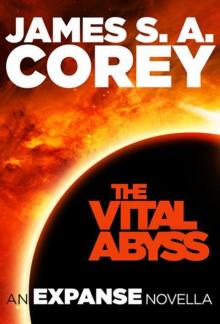 The Vital Abyss: An Expanse Novella (The Expanse)
The Vital Abyss: An Expanse Novella (The Expanse) Leviathan Wakes e-1
Leviathan Wakes e-1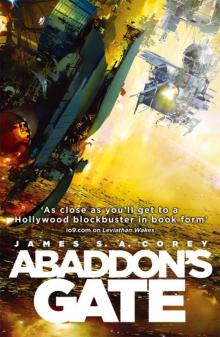 Abaddon's Gate e-3
Abaddon's Gate e-3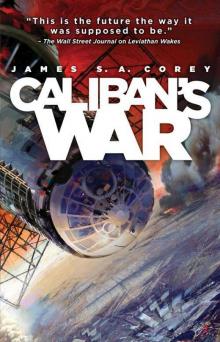 Caliban;s war e-2
Caliban;s war e-2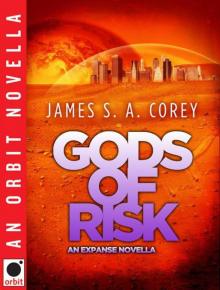 Gods of Risk: An Expanse Novella
Gods of Risk: An Expanse Novella Honor Among Thieves: Star Wars (Empire and Rebellion)
Honor Among Thieves: Star Wars (Empire and Rebellion)